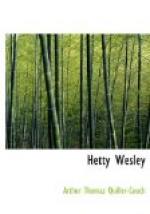Molly, who had been plucking and twisting all this while the twig between her fingers, suddenly cast it on the ground and hobbled away.
John gazed after her, picked up the book and set it down again. The sermon came easily now.
Having thought it out and arranged the headings in his mind, he returned to the house and wrote rapidly for two hours in his bedroom. He then collected his manuscript, folded it neatly, scribbled a note, and called down the passage to the servant, Jane, whom he heard bustling about the parlour and laying dinner. To her he gave the note and the sermon, to be carried to his father; picked up a crust of bread from the table; and a minute later left the house for a long walk.
Returning a little before supper-time, he found the manuscript on the table by his bedside. No note accompanied it; there were none of the usual pencil-marks and comments in the margin. The Rector had restored it without a word.
For a moment he was minded to go and seek an interview; but decided that, his resolution being fixed, an interview would but increase pain to no purpose. He washed and went down to the parlour, walking past the door of the study, in which his father supped alone.
Next morning being Saturday, Mr. Wesley walked over to Epworth, to a room above a chandler’s shop, where he and John lodged in turn as they took Epworth duty on alternate Sundays. The Rectory there was closed for the time and untenanted, the Ellisons having returned some months before to their own enlarged and newly furnished house. There, to be sure, a lodging might have been had at no cost, and Sukey offered it as in duty bound. She knew very well, however, that neither her father nor John could stomach being a guest of Dick’s. The invitation was declined, and she did not press it.
So on Sunday, August 28th, Mr. Wesley took the services at Epworth while John stayed at home and preached his sermon in Wroote church.
From the pulpit he looked straight down into the tall Rectory pew, and once or twice his eyes involuntarily sought its occupants. Once, indeed, he paused in his discourse. It was after the words— “We are totally mistaken if we persuade ourselves that Christ was lenient towards sin. He made no hesitation in driving the money-changers from His Father’s temple even with a whip. But He discriminated between the sin and the sinner. The fig-tree He blasted was one which, bearing no fruit, yet made a false show of health: the Pharisees He denounced were men who covered rottenness with a pretence of religion; the sinners He consorted with had a saving knowledge of their vileness. Sin He knew to be human and bound up in our nature: all was pardonable save the refusal to acknowledge it and repent, which is the sin against the Holy Ghost testifying within us. If we confess our sins not only is He faithful and just to forgive them, but He promises more joy in Heaven over our repentance




